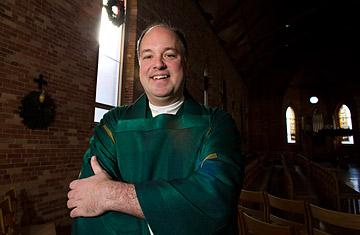
The Green Bay Packers' chaplain, Father James Baraniak, in his green vestment inside St. Norbert College Church
For most of football season, Father James Baraniak wears his green vestment with gold lining when he performs Mass in Green Bay, Wis. And while it has nothing to do with the Packers' team colors — green is mandated by the Vatican — it is something of a holy coincidence, given the fact that he has been the Packers' chaplain for the past 13 years.
Still, sometimes his primary allegiance with the church causes some playful friction with the team.
"During Advent, I am obligated to wear purple, the color of penitence but also the Minnesota Vikings," he says. "If we play them at that time, you can bet the players will have a bit of fun with me and call me a traitor."
Every football team in the NFL has at least one chaplain to whom the players and coaches can turn for religious guidance. And though some may question the appropriateness of bringing one popular American Sunday pastime — God — into a considerably more commercial and violent Sunday pastime, the chaplains believe it is precisely their mission to help reconcile the two. Forget the mysteries of the sacraments — what about the answers to these theological questions: Does God want us to lose? Does he favor the Steelers? What makes Lambeau Field sacred? Is it right to pray for first downs when people are suffering? And who caused that fumble, Jesus or Julius Peppers?
Owners and coaches try to take care of their players physically, financially and psychologically, but they understand that players have spiritual needs too. And the more the players are spiritually at peace, the more they can focus on the game. Some teams favor a group approach — the Indianapolis Colts, for example, have three go-to spiritual receivers, covering Protestant and Catholic denominations. (The NFL is overwhelmingly Christian; when the occasional Jewish or Muslim player requires counsel, the teams generally outsource.) And it's not just the players who make use of chaplains' services. On game day, some chaplains can be seen in the cement concourses hustling back and forth from the owner's box to the sidelines quelling anxieties and quieting doubt.
The chaplains are often former professional athletes. Adam Burt, an Evangelical chaplain for the New York Jets, spent 14 seasons in the NHL. As ex-players, they understand the anxieties of always being watched and evaluated, and experience can be next to godliness. "Moses went through the desert himself before he took the Israelites through it," says Pastor James Trapp of the Atlanta Falcons, who was a defensive back on the 2000 Baltimore Ravens championship team. They aren't paid team salaries but usually fall under the managerial rubric of "player development." (At least one, the chaplain for the Chicago Bears, has an office in the training complex.) Financial support comes from their outside work, and players are free to contribute to those ministries, if they choose. The chaplains say the strong faith of many of the coaches and owners creates favorable working conditions, allowing them a wide degree of access.
And on any given Sunday during football season, they need it. There are chapel services prior to the game, and the chaplains often lead the Lord's Prayer pre-game in the locker room and again post-game, with both teams at the 50-yard line. (Participation is optional, and many players abstain from religious services, not wanting to mix their professional lives with their spiritual ones.)
